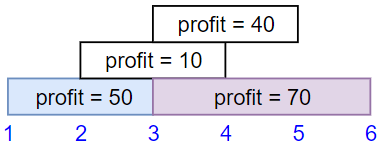Maximum Profit in Job Scheduling
Description
We have n jobs, where every job is scheduled to be done from startTime[i] to endTime[i], obtaining a profit of profit[i].
You're given the startTime , endTime and profit arrays, you need to output the maximum profit you can take such that there are no 2 jobs in the subset with overlapping time range.
If you choose a job that ends at time X you will be able to start another job that starts at time X.
Example 1:

Input: startTime = [1,2,3,3], endTime = [3,4,5,6], profit = [50,10,40,70] Output: 120 Explanation: The subset chosen is the first and fourth job. Time range [1-3]+[3-6] , we get profit of 120 = 50 + 70.
Example 2:

Input: startTime = [1,2,3,4,6], endTime = [3,5,10,6,9], profit = [20,20,100,70,60] Output: 150 Explanation: The subset chosen is the first, fourth and fifth job. Profit obtained 150 = 20 + 70 + 60.
Example 3:

Input: startTime = [1,1,1], endTime = [2,3,4], profit = [5,6,4] Output: 6
Constraints:
1 <= startTime.length == endTime.length == profit.length <= 5 * 10^41 <= startTime[i] < endTime[i] <= 10^91 <= profit[i] <= 10^4
Solution(javascript)
/*
* @lc app=leetcode id=1235 lang=javascript
*
* [1235] Maximum Profit in Job Scheduling
*/
// @lc code=start
/** MIT Weighted Interval Scheduling
* http://www.cs.umd.edu/class/fall2017/cmsc451-0101/Lects/lect10-dp-intv-sched.pdf
* Top-down approach: stack overflow
* @param {number[]} startTime
* @param {number[]} endTime
* @param {number[]} profit
* @return {number}
*/
// const jobScheduling = function (startTime, endTime, profit) {
// const arr = startTime.reduce((acc, start, index) => {
// acc.push([start, endTime[index], profit[index]])
// return acc
// }, [])
// arr.sort((a, b) => a[1] - b[1])
// const memo = []
// let max = 0
// const aux = (index) => {
// if (index < 0) {
// return 0
// }
// if (memo[index] !== undefined) {
// return memo[index]
// }
// let prevIndex = -1
// for (let i = index - 1; i >= 0; i--) {
// if (arr[i][1] <= arr[index][0]) {
// prevIndex = i
// break
// }
// }
// memo[index] = Math.max(
// aux(index - 1),
// arr[index][2] + aux(prevIndex),
// )
// max = Math.max(max, memo[index])
// return memo[index]
// }
// aux(arr.length - 1)
// return max
// }
const jobScheduling = function (startTime, endTime, profit) {
const arr = startTime.reduce((acc, start, index) => {
acc.push([start, endTime[index], profit[index]])
return acc
}, [])
arr.sort((a, b) => a[1] - b[1])
const memo = []
let max = 0
const getPrevIndex = (left, right, target) => {
let result = -1
while (left <= right) {
const middle = Math.floor((left + right) / 2)
if (arr[middle][1] <= target) {
left = middle + 1
result = middle
} else {
right = middle - 1
}
}
return result
}
for (let i = 0; i < arr.length; i++) {
const prevIndex = getPrevIndex(0, i, arr[i][0])
memo[i] = Math.max(
(memo[i - 1] || 0),
arr[i][2] + (memo[prevIndex] || 0),
)
max = Math.max(max, memo[i])
}
return max
}
